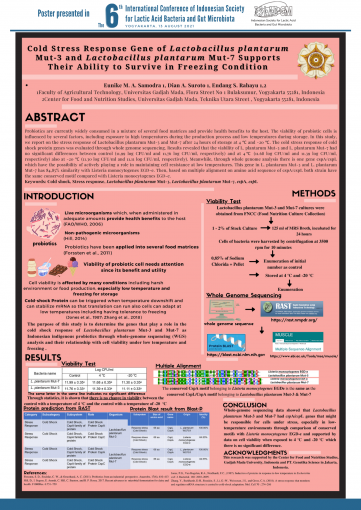
By: Eunike M. A. Samodra, Dian A. Suroto, Endang S. Rahayu
ABSTRACT
Probiotics are currently widely consumed in a mixture of several food matrices and provide health benefits to the host. The viability of probiotic cells is influenced by several factors, including exposure to high temperatures during the production process and low temperatures during storage. In this study, we report on the stress response of Lactobacillus plantarum Mut-3 and Mut-7 after 24 hours of storage at 4 ℃ and -20 ℃. The cold stress response of cold shock protein genes was evaluated through whole genome sequencing. Results revealed that the viability of L. plantarum Mut-3 and L. plantarum Mut-7 had no significant differences between control (11,99 log CFU/ml and 11,76 log CFU/ml, respectively) and at 4℃ (11.68 log CFU/ml and 11.39 log CFU/ml, respectively) also at -20 ℃ (11.30 log CFU/ml and 11.11 log CFU/ml, respectively). Meanwhile, through whole genome analysis there is one gene cspA/cspL which have the possibility of actively playing a role in maintaining cell resistance at low temperatures. This gene in L. plantarum Mut-3 and L. plantarum Mut-7 has 84,85% similarity with Listeria monocytogenes EGD-e. Then, based on multiple alignment on amino acid sequence of cspA/cspL both strain have the same conserved motif compared with Listeria monocytogenes EGD-e.
Keywords: Cold shock, Stress response, Lactobacillus plantarum Mut-3, Lactobacillus plantarum Mut-7, cspA, cspL
*This poster was presented in The 6th International Conference of Indonesian Society for Lactic Acid Bacteria and Gut Microbiota (6th ISLAB) on 13th August 2021
More information about the poster -> Click here
More information about the event -> Click here
